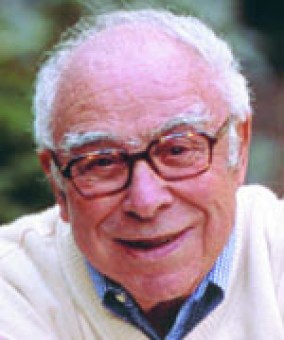President’s Message
By Jerry Zezima
President
National Society of Newspaper Columnists

Jerry Zezima
In this season of thanksgiving, so called because it’s the season in which we celebrate Thanksgiving, I would like to thank Art Buchwald for inspiring me to go into journalism and write a humor column, which has spared me the shame of getting a real job.
One of Buchwald’s most famous columns, and his personal favorite, was the one he wrote in 1953, explaining Thanksgiving to the French.
From 1949 to 1962, Buchwald wrote a humor column for the Paris edition of the New York Herald Tribune. It was a part of his career that almost nobody remembers or knows about but which, in my opinion, was his best, even better than his more illustrious period when he returned to the United States, settled in Washington, D.C., and for more than 40 years lampooned politicians as well as anyone, including Will Rogers, ever has.

Art Buchwald
Buchwald won the NSNC’s Ernie Pyle Lifetime Achievement Award in 2006 and died the following year (on the advice of my attorney, I must say that there is no connection). Buchwald was one of the most influential newspaper columnists of his time and one of the greatest humorists in the history of journalism.
I hereby reprint his classic Thanksgiving column, which was reprinted in The Washington Post and other newspapers every year until his death. It is reprinted here with the permission of the Buchwald family, which owns the rights to all of Art’s work.
Afterward, I will explain why we in the NSNC should be thankful.
• • •
Le Grande Thanksgiving
By Art Buchwald
One of our most important holidays is Thanksgiving Day, known in France as le Jour de Merci Donnant.
Le Jour de Merci Donnant was first started by a group of Pilgrims (Pèlerins) who fled from l’Angleterre before the McCarran Act to found a colony in the New World (le Nouveau Monde) where they could shoot Indians (les Peaux-Rouges) and eat turkey (dinde) to their hearts’ content.
They landed at a place called Plymouth (now a famous voiture Américaine) in a wooden sailing ship called the Mayflower (or Fleur de Mai) in 1620. But while the Pèlerins were killing the dindes, the Peaux-Rouges were killing the Pèlerins, and there were several hard winters ahead for both of them. The only way the Peaux-Rouges helped the Pelerins was when they taught them to grow corn (mais). The reason they did this was because they liked corn with their Pèlerins.
In 1623, after another harsh year, the Pèlerins’ crops were so good that they decided to have a celebration and give thanks because more mais was raised by the Pèlerins than Pèlerins were killed by Peaux-Rouges.
Every year on the Jour de Merci Donnant, parents tell their children an amusing story about the first celebration.
It concerns a brave capitaine named Miles Standish (known in France as Kilometres Deboutish) and a young, shy lieutenant named Jean Alden. Both of them were in love with a flower of Plymouth called Priscilla Mullens (no translation). The vieux capitaine said to the jeune lieutenant:
“Go to the damsel Priscilla (allez très vite chez Priscilla), the loveliest maiden of Plymouth (la plus jolie demoiselle de Plymouth). Say that a blunt old captain, a man not of words but of action (un vieux Fanfan la Tulipe), offers his hand and his heart, the hand and heart of a soldier. Not in these words, you know, but this, in short, is my meaning.
“I am a maker of war (je suis un fabricant de la guerre) and not a maker of phrases. You, bred as a scholar (vous, qui t’es pain comme un étudiant), can say it in elegant language, such as you read in your books of the pleadings and wooings of lovers, such as you think best adapted to win the heart of the maiden.”
Although Jean was fit to be tied (convenable très emballé), friendship prevailed over love and he went to his duty. But instead of using elegant language, he blurted out his mission. Priscilla was muted with amazement and sorrow (rendue muette par l’étonnement et la tristesse).
At length she exclaimed, interrupting the ominous silence: “If the great captain of Plymouth is so very eager to wed me, why does he not come himself and take the trouble to woo me?” (Où est-il, le vieux Kilometres? Pourquoi ne vient-il pas auprès de moi pour tenter sa chance?)
Jean said that Kilometres Deboutish was very busy and didn’t have time for those things. He staggered on, telling what a wonderful husband Kilometres would make. Finally Priscilla arched her eyebrows and said in a tremulous voice, “Why don’t you speak for yourself, Jean?” (Chacun a son gout.)
And so, on the fourth Thursday in November, American families sit down at a large table brimming with tasty dishes and, for the only time during the year, eat better than the French do.
No one can deny that le Jour de Merci Donnant is a grande fête and no matter how well fed American families are, they never forget to give thanks to Kilometres Deboutish, who made this great day possible.
• • •
As both the Americans and the French would say, magnifique! Here is another reason why we should be thankful for Art Buchwald.
In 1989, he sued Paramount Pictures for stealing his idea for a movie that Paramount made into the 1988 Eddie Murphy comedy, Coming to America.
Buchwald won the case, exposing Hollywood’s shady accounting practices and striking a blow for the rights of writers.
This is especially important to remember when we meet in Los Angeles for our 2016 conference, which will be held June 23-26 at the Hotel Angeleno. Please sign up now. Here is the link to our room block, tinyurl.com/NatlSocietyNewspaperColumnists.
The general theme of the conference is turning our work into movies or TV shows. Thanks to Art Buchwald, our work is protected. And for that, there is only one thing to say:
Merci beaucoup, Art!
• • •
Jerry Zezima is a syndicated humor columnist for The Stamford (Connecticut) Advocate.
• • •
This piece first was published in the November 2015 issue of The Columnist, the monthly membership newsletter of the National Society of Newspaper Columnists.

